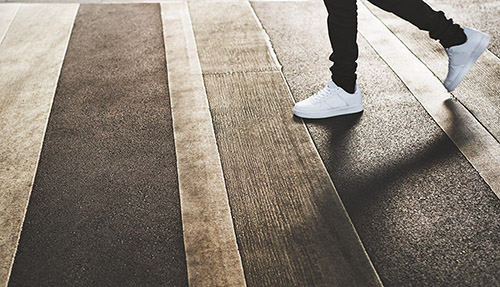
Ever have a neighbor that unnerves you? I have. She has scared my kids many times with her loud noises and threatening tone whenever they’re outside. Believe me, my kids keep their distance! One Shabbos afternoon, there was pounding on my front door. My then 3-year-old son opened the door. And there she was—our neighbor! My son and she both stood there, staring at each other in shock. She was shocked that we opened the door, and my son…let out a piercing scream: “AHHHHHH!!—the lady next door!” and slammed the door in her face.
On the first day of Selichos in Elul, we say, “Zochalim v’roadim miyom boecha—we are quivering and trembling regarding the day You are coming.” This refers to the time period of the Aseres Yemei Teshuva, the Ten Days of Repentance. The Selichos describe these days as days when Hashem is coming to visit us. Starting from Rosh Hashanah, Hashem knocks on our doors. We open the door, and suddenly we are standing face to face with Hashem! Each day, for 10 days. Are we afraid to face Him, and then lock the door after Neilah? Or do we bravely let Him into our lives?
During this period of time, we think about what we can do in the way of teshuva. The Mabit defines teshuva as returning, to be close to Hashem, from the distance we ourselves created as a result of committing sins. Many of us get caught in the trap of discouragement. Dovid HaMelech says “sur mei’ra va’aseih tov—stay away from evil and do good.” One interpretation of this directive is to stop doing wrong, and then afterwards focus on doing good. But we may get discouraged if we aren’t initially successful. Temptations get in the way of our good faith attempts. Rav Nosson Wachtfogel says there is a different way to read the pasuk: Stay away from evil BY doing good. We have to start our program of teshuva by focusing on doing good in the first instance, and through the good we do, we will be successful in no longer wanting to get involved in the bad behaviors of our past.
Doing just one small positive act—taking one step closer to Hashem—that’s a real step ahead in the teshuva journey. Hashem is so excited even by our one little step! When my grandchildren started to learn how to walk, they would take one step and then fall flat on their faces. We all would smile, clap, and cheer, “Hooray!” And this repeated itself with every step they would take. Another step … another fall. Yet the parents are so happy, because they know these initial falls will lead to success. This is true for us as well. If we take one step forward in attempting teshuva and fall on our faces, it’s okay. Hashem is cheering us on—to our eventual success in getting closer to Him!
The Shulchan Aruch says that during the Aseres Yemei Teshuva even those who are not careful to eat pas Yisrael should do so during these 10 days. The poskim discuss whether one should also take on extra stringencies for these 10 days. Let’s be real: for most people, these extras disappear right after Yom Kippur. Still, little steps towards closeness to Hashem can have a lasting impact, even if short-term.
Anyone wanting to deepen a relationship with another party doesn’t wait for the other person to do something. We take the first step—call, send a gift, reach out. Hashem is at our door. We need to open the door and invite Him in! It’s up to us to take that first step.
We say in the prayer of L’Dovid Hashem Ori (which we recite daily from Elul to Shemini Atzeres) “I seek Your face, Hashem.” During the Aseres Yemei Teshuva, our door is open and Hashem is standing in the doorway. We are face to face with Hashem. What should we do? We can stand and stare, or we can make a move to invite Hashem into our lives and get closer. All we need is to take one positive step.
Let’s take on one new thing that brings us closer to Hashem, and with that, invite Hashem more deeply into our homes and into our lives. Hashem is supportively waiting for us at the door.
Rabbi Baruch Bodenheim is the associate rosh yeshiva of Passaic Torah Institute (PTI)/Yeshiva Ner Boruch, where he leads a multi-level Gemara-learning program. PTI has attracted adult Jews of all ages from all over northern New Jersey for its learning programs. Fees are not charged but any contributions are always welcome. Beyond PTI, Rabbi Bodenheim conducts a weekly beis midrash program with chavrusa learning in Livingston plus a monthly group in West Caldwell. Rabbi Bodenheim can be reached at [email protected]. For more info about PTI and its Torah classes, visit www.pti.shulcloud.com.













